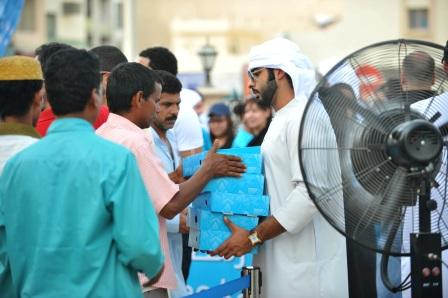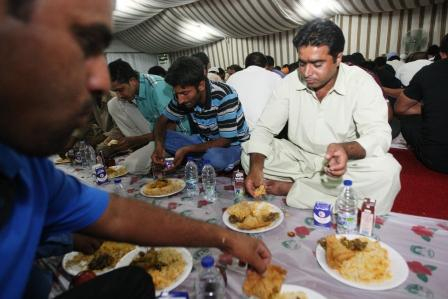
It’s 5pm and Ali Ghanoukhan, a gardener working in The Springs, waits patiently for the sun to go down so he can end his fast. The 25-year-old Pakistani has been working in Dubai for the past seven years. He lives in a shared accommodation with 40 others who share the same faith; they religiously fast while working outdoors where the average temperature soars to over 45 degrees Celsius in July.
“Fasting is something I was taught as a child and I practise it religiously. Working in the heat is something you learn to do if you need to feed your hungry stomach and that of your family.
“For a labourer such as myself, Ramadan is also the season of generosity. Every evening I end my fast at the local masjid where the well-to-do arbabs treat us to an iftar. I look forward to this month as it’s not just a season of giving for the privileged, but one of receiving for a person like me. Getting free clothes and shoes helps me in a big way as I can save some money and send it back to my family in Pakistan,” Ghanoukhan says. Arbab is a Persian or Urdu term meaning master or landlord.
Ramadan means different things to different people. For Muslims worldwide this is a time of deep reflection. The practice of abstaining from food and drink is not about making followers hungry or thirsty. It is about understanding self-restraint and forging a closer union with God. Supporting the less fortunate during Ramadan is believed to increase an individual’s hasanat (blessings) and open the doors of jannah (heaven). Consequently, there is a big emphasis on philanthropy and charity during Ramadan.
His Highness Shaikh Mohammad Bin Rashid Al Maktoum, Vice-President and Prime Minister of the UAE and Ruler of Dubai, recently launched the Water Aid campaign to give more than five million people worldwide access to fresh drinking water. Within ten days it had collected more than Dh100 million in donations — enough to provide clean water to four million people in developing countries.
The Dusit Thani Dubai will donate a percentage of takings from every meal ordered during Ramadan to Operation Smile. Danelle Palang, Director Marketing and Communications, says, “We plan to raise around Dh6,000. This money will help at least four children with facial deformities such as cleft lip and cleft palate to smile properly by offering free constructive surgeries and after-care treatments to those who cannot afford it.”
Du’s #30DaysofSharing campaign sees the company donate Dh10 towards iftar meals for the less fortunate every time the hashtag is shared on social media in the holy month, while Nabooda Automobiles is working with the Al Ihsan Charity Association during Ramadan to improve road safety.
Other initiatives include the Dubai Department of Economic Development’s Shred a Designer Handbag campaign, which aims to raise public awareness of counterfeit goods through donations.
Projects such as Ramadan Mir are raising funds to support over 15,000 families every year by providing them secure food packages, coupons and e-cards to help tide over the expenses incurred during Ramadan.
Token gestures?
However, the sceptic reading about these Ramadan projects might ask if the holy month is truly the season of giving — or is it one for free publicity where corporations make token gestures to disadvantaged orphans, widows or families in need?
“Actually this works both ways,” says Hashem Alhashmi, a 35-year-old Emirati banker. “Some corporations run token campaigns to boost their image, but there is nothing bad about this as at the end of the day a lot of underprivileged people benefit from their generosity. I think a lot of people genuinely embrace Ramadan as the time of year to actually contribute to the less fortunate — irrespective of the size of their wallet.”
Those on the receiving end remain grateful. Mohammad Shohag, a 24-year-old cleaner from Dhaka who has been working in Dubai for the past three years, was swindled by his business partner back home and lost his money and his business. His family sold their land and took a 250,000 taka (Dh11,833) loan to pay an agent to find him a job in Dubai. Last year, Shohag was working as a cleaner in an office and some of the workers in the company ran a collection drive and presented him with a cheque to repay part of his loan. “This has reaffirmed my belief that Allah will provide,” he says.
Seasonal spirit
Tokenism or not, during Ramadan there is a focus on charity and whether Muslim or not, residents cannot help diving in and doing their bit.
Take the lead from Daliah Al Kourdi, an Emirati 32-year-old working mum of two. She is a big advocate of sharing the little you have. “I buy chilled bottled water for labourers working in the heat or offer iftar meals to people in need. It’s the small things that make a big difference in people’s lives,” she says.












